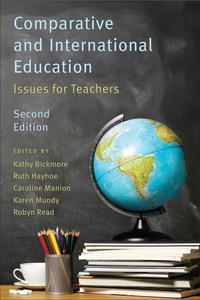
Comparative & International Education
$95.50
Item#: 9781551309514
Available: 99999
On Order: 0
In our increasingly globalized world, it is vital to explore major issues in education today through an international and intercultural lens. Thoroughly updated and expanded, this comprehensive new edition introduces students to research in comparative and international education while providing an overview of educational practices in diverse settings.
Contributors draw on comparative research from the Americas, Australia, Africa, Asia, Europe, and the Middle East, and engage with such themes as the history and philosophy of comparative education, the right to education, alternative pedagogies, gender, Indigenous knowledge, peacebuilding, international assessments, and global citizenship. The updates to this edition include new chapters on human rights education and the internationalization of schooling, and a greater focus on issues of diversity and social justice education. Designed as a resource for teacher education programs, each chapter highlights the significance and the implications of the particular topic for teachers.
Comparative and International Educationfeatures a vivid portrayal of global educational practices, contributions from preeminent scholars from around the world, and invaluable teaching tools, including discussion questions, video suggestions, and further readings. This essential collection will be an indispensable resource for teachers, teachers-in-training, and students of comparative and international education.
Contributors draw on comparative research from the Americas, Australia, Africa, Asia, Europe, and the Middle East, and engage with such themes as the history and philosophy of comparative education, the right to education, alternative pedagogies, gender, Indigenous knowledge, peacebuilding, international assessments, and global citizenship. The updates to this edition include new chapters on human rights education and the internationalization of schooling, and a greater focus on issues of diversity and social justice education. Designed as a resource for teacher education programs, each chapter highlights the significance and the implications of the particular topic for teachers.
Comparative and International Educationfeatures a vivid portrayal of global educational practices, contributions from preeminent scholars from around the world, and invaluable teaching tools, including discussion questions, video suggestions, and further readings. This essential collection will be an indispensable resource for teachers, teachers-in-training, and students of comparative and international education.
Table of Contents
Preface
List of Abbreviations
Chapter One:Why Study Comparative Education?
Ruth Hayhoe, Caroline Manion, and Karen Mundy
SECTION I: (RE)FORMING SCHOOLING: PHILOSOPHY, POLICY, AND SCHOOL ORGANIZATION
Chapter Two:Philosophy and Comparative Education: What Can We Learn from East Asia?
Ruth Hayhoe and Jun Li
Chapter Three:Reinventing Schooling: Successful Radical Alternatives from the Global South
Joseph P. Farrell, Caroline Manion, and Santiago Rincón-Gallardo
Chapter Four:Understanding Pedagogy: Cross-Cultural and Comparative Insights from Central Asia
Sarfaroz Niyozov
Chapter Five:Comparative Perspectives on School Improvement
Stephen Anderson and Malini Sivasubramaniam
SECTION II: JUSTICE, KNOWLEDGES FOR CHANGE, AND SOCIAL INCLUSION
Chapter Six:Comparative Indigenous Ways of Knowing and Learning
Katia Sol Madjidi and Jean-Paul Restoule
Chapter Seven:Gender and Education
Kara Janigan and Vandra Lea Masemann
Chapter Eight:Human Rights Education for Social Change: Experiences from South Asia
Monisha Bajaj
Chapter Nine:Global Citizenship Education in Schools: Evolving Understandings, Constructing Practices
Mark Evans and Dina Kiwan
Chapter Ten:Conflict, Peacebuilding, and Education: Rethinking Pedagogies in Divided Societies, Latin America, and Around the World
Kathy Bickmore
SECTION III: EDUCATION IN THE WORLD SYSTEM: GLOBALIZATION AND DEVELOPMENT
Chapter Eleven:Education for All: Comparative Sociology of Schooling in Africa and Beyond
Karen Mundy and Robyn Read
Chapter Twelve:The Internationalization of Schooling: Implications for Teachers
Julia Resnik
Chapter Thirteen:International Education Indicators and Assessments: Issues for Teachers
Anna K. Chmielewski, Joseph P. Farrell, and Karen Mundy
About the Contributors
Index
List of Abbreviations
Chapter One:Why Study Comparative Education?
Ruth Hayhoe, Caroline Manion, and Karen Mundy
SECTION I: (RE)FORMING SCHOOLING: PHILOSOPHY, POLICY, AND SCHOOL ORGANIZATION
Chapter Two:Philosophy and Comparative Education: What Can We Learn from East Asia?
Ruth Hayhoe and Jun Li
Chapter Three:Reinventing Schooling: Successful Radical Alternatives from the Global South
Joseph P. Farrell, Caroline Manion, and Santiago Rincón-Gallardo
Chapter Four:Understanding Pedagogy: Cross-Cultural and Comparative Insights from Central Asia
Sarfaroz Niyozov
Chapter Five:Comparative Perspectives on School Improvement
Stephen Anderson and Malini Sivasubramaniam
SECTION II: JUSTICE, KNOWLEDGES FOR CHANGE, AND SOCIAL INCLUSION
Chapter Six:Comparative Indigenous Ways of Knowing and Learning
Katia Sol Madjidi and Jean-Paul Restoule
Chapter Seven:Gender and Education
Kara Janigan and Vandra Lea Masemann
Chapter Eight:Human Rights Education for Social Change: Experiences from South Asia
Monisha Bajaj
Chapter Nine:Global Citizenship Education in Schools: Evolving Understandings, Constructing Practices
Mark Evans and Dina Kiwan
Chapter Ten:Conflict, Peacebuilding, and Education: Rethinking Pedagogies in Divided Societies, Latin America, and Around the World
Kathy Bickmore
SECTION III: EDUCATION IN THE WORLD SYSTEM: GLOBALIZATION AND DEVELOPMENT
Chapter Eleven:Education for All: Comparative Sociology of Schooling in Africa and Beyond
Karen Mundy and Robyn Read
Chapter Twelve:The Internationalization of Schooling: Implications for Teachers
Julia Resnik
Chapter Thirteen:International Education Indicators and Assessments: Issues for Teachers
Anna K. Chmielewski, Joseph P. Farrell, and Karen Mundy
About the Contributors
Index
Asset: NEW COURSE MATERIALS
Format: Paperback
Edition: 02
Department: 01 Course Materials
Section: 01 Eadm Ed Administr
Author: Bickmore, et al.. (Eds)
Publisher: Cdn Scholars Press
Publication Year: 2017
Notes: Sp $77 8nov22 Em



